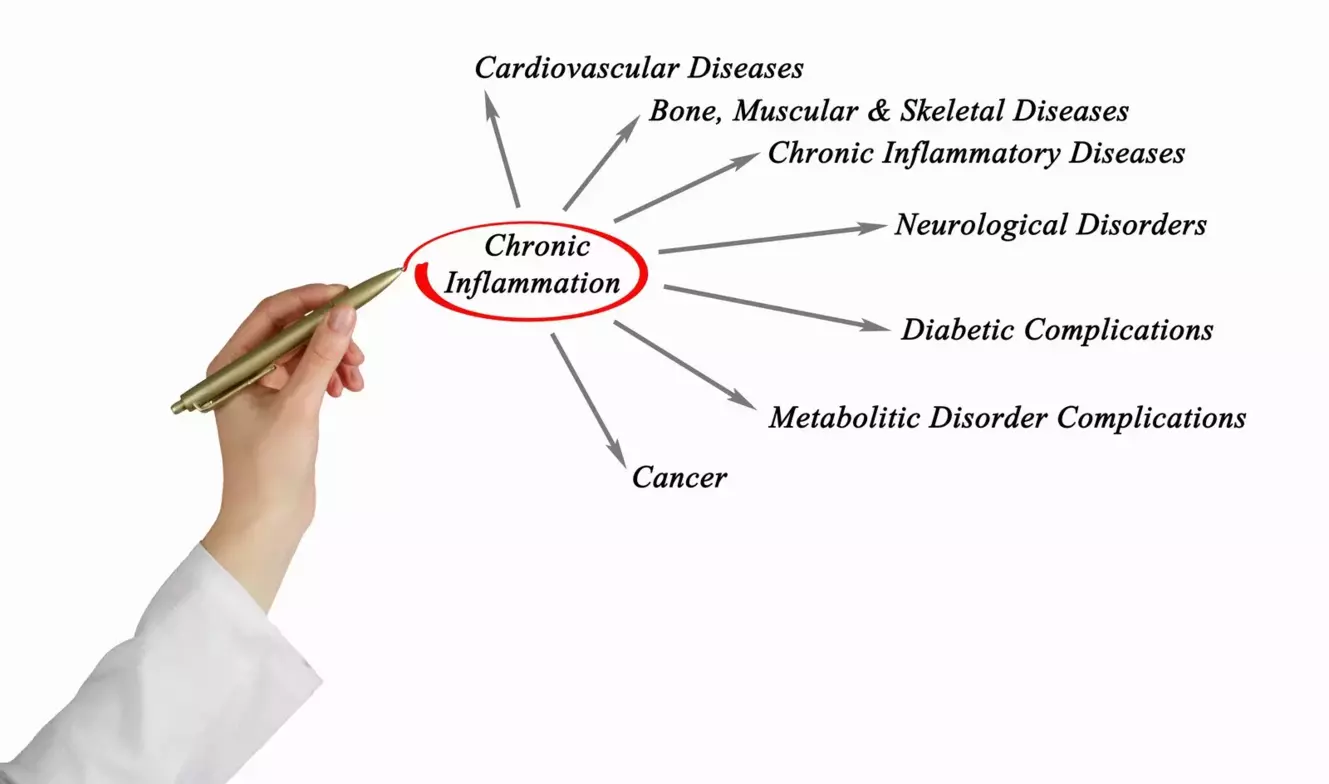
How Inflammation Affects More Than Just Your Joints
When people hear the word "inflammation," they often think of swollen joints, sore muscles, or visible swelling and redness that occur after an injury. However, inflammation is far more complex and far-reaching than many realize.
Chronic low-grade inflammation has been implicated in nearly every major chronic disease, from heart disease and diabetes to neurodegeneration and certain cancers. It's often silent, systemic, and persistent, slowly affecting tissues and organs over time.
Understanding what inflammation is, its causes, and its impact on the entire body can empower you to make informed choices that support long-term health and resilience.
What is Inflammation?
At its core, inflammation is a necessary part of the body's biological defense mechanism. It's how your immune system responds to injury, infection, or irritation.
There are two main types:
1. Acute Inflammation
This is the body's immediate, short-term response to injury or infection. It's marked by:
- Redness
- Swelling
- Heat
- Pain
- Loss of function (e.g., stiffness)
Acute inflammation is protective. It brings white blood cells and nutrients to the area to fight pathogens and begin healing. Once the job is done, inflammation should subside.
2. Chronic Inflammation
Chronic inflammation, on the other hand, is persistent and low-grade, often without noticeable signs. It occurs when:
- The immune system remains activated unnecessarily
- The body fails to eliminate a trigger
- There's ongoing tissue damage or immune dysregulation
This type of inflammation doesn't help you heal. Instead, it can silently damage tissues and contribute to dysfunction across multiple systems.
What Causes Chronic Inflammation?
There is rarely a single cause. Chronic inflammation is usually the result of cumulative lifestyle and environmental factors that disrupt the immune system's balance over time.
Common contributors include:
- Poor diet (excess consumption of sugar, refined carbs, processed foods)
- Sedentary lifestyle
- Chronic stress
- Sleep deprivation
- Environmental toxins
- Hidden infections (e.g., viral, dental, or gut-related)
- Imbalanced gut microbiome
- Excess body fat (especially around the abdomen)
- Autoimmune dysfunction
Individually, these stressors may seem minor, but collectively, they prime the body for inflammation that never truly resolves.
How Inflammation Affects the Entire Body
Chronic inflammation impacts more than just joints. It alters immune activity, hormone function, metabolic pathways, and even brain chemistry.
Here's a breakdown of how it can affect major body systems:
1. Musculoskeletal System
- Joint pain and stiffness are classic signs of localized inflammation.
- Conditions like arthritis and tendinopathies are inflammatory in nature.
- Chronic inflammation can also delay muscle recovery and lead to tissue degeneration.
2. Cardiovascular System
- Inflammation plays a role in atherosclerosis, where plaques accumulate in the arterial walls.
- Inflammatory markers like C-reactive protein (CRP) are associated with an increased risk of heart attack and stroke.
- Inflammation can impair vascular function, increase blood pressure, and disrupt cholesterol metabolism.
3. Metabolic System
- Inflammation contributes to insulin resistance, a precursor to type 2 diabetes.
- It affects how the body stores and uses glucose and fat.
- Chronic inflammation is often present in metabolic syndrome, a cluster of conditions that includes high blood pressure, elevated blood sugar, excess abdominal fat, and abnormal cholesterol levels.
4. Digestive System
- Chronic inflammation can damage the gut lining, leading to conditions like leaky gut syndrome.
- It disrupts the microbiome, leading to dysbiosis (imbalanced gut flora).
- It can trigger or exacerbate inflammatory bowel diseases, including Crohn's disease and ulcerative colitis.
5. Nervous System
- Inflammatory cytokines can cross the blood-brain barrier, influencing brain chemistry and cognition.
- Chronic inflammation is linked to depression, anxiety, fatigue, and brain fog.
- It's also a factor in neurodegenerative diseases like Alzheimer's and Parkinson's.
6. Immune System
- Chronic inflammation confuses immune signaling, rendering the system less efficient at targeting genuine threats and more prone to overreact.
- This can result in autoimmune conditions, where the immune system mistakenly attacks healthy tissues (e.g., Hashimoto's thyroiditis, lupus, rheumatoid arthritis).
- It also leaves the body more vulnerable to infections and slows recovery from illness or injury.
How To Know If Inflammation Might Be Affecting You
Chronic inflammation is often invisible, but common signs include:
- Persistent fatigue
- Brain fog or poor concentration
- Joint or muscle aches
- Digestive issues (bloating, reflux, irregularity)
- Frequent colds or slow wound healing
- Skin conditions (acne, eczema, psoriasis)
- Headaches or migraines
- Mood changes or irritability
Lab tests, such as hs-CRP, ferritin, homocysteine, ESR, and cytokine panels, can offer more insight into your inflammatory status.
Managing and Reducing Chronic Inflammation
The good news is that chronic inflammation is modifiable. You can reduce it with intentional lifestyle changes.
1. Nutrition
- Emphasize anti-inflammatory foods, such as leafy greens, fatty fish, olive oil, turmeric, berries, nuts, and seeds.
- Reduce your intake of pro-inflammatory foods, including sugar, refined carbs, seed oils, trans fats, and processed foods.
- Maintain balanced blood sugar levels through regular meals that include fiber, protein, and healthy fats.
2. Physical Activity
- Regular exercise helps regulate the immune system and lower chronic inflammation
- Focus on strength training, walking, swimming, and yoga, avoiding overtraining and excessive cardio.
3. Sleep
- Prioritize 7-9 hours of quality sleep.
- Poor sleep raises inflammatory markers and impairs recovery.
4. Stress Management
- Chronic psychological stress drives chronic inflammation.
- Techniques such as breathwork, mindfulness, and journaling are practical tools for managing stress.
5. Gut Health
- Support a healthy microbiome with fermented foods, fiber, and prebiotics.
- Avoid excessive antibiotic use unless necessary.
6. Targeted Supplementation (when appropriate)
- Omega-3 fatty acids (EPA/DHA)
- Curcumin (from turmeric)
- Vitamin D
- Magnesium
- Probiotics
Always consult a healthcare provider before starting new supplements, especially if you're managing a health condition or taking medications.
How Arthrology Chiropractic Can Help
At Arthrology Chiropractic, we take a root-cause, systems-based approach to health. That means looking beyond localized symptoms and addressing the broader picture, including chronic inflammation.
Whether you're struggling with joint pain, digestive issues, fatigue, or stress-related symptoms, we aim to:
- Identify inflammatory triggers
- Improve biomechanics and joint function
- Guide lifestyle changes that lower systemic inflammation
- Incorporate functional lab tests when needed
- Support your recovery and health with personalized, evidenced-based care
Final Thoughts
Inflammation is not inherently harmful; in fact, it plays a vital role in healing and immune defense. However, when inflammation becomes chronic and uncontrolled, it can gradually weaken the systems that maintain your health.
The most effective strategies for combating chronic inflammation aren't found in a pill; they are rooted in your daily habits, including your diet, physical activity, sleep, and stress management.
If you're ready to explore how inflammation might be affecting your health, we're here to help.

Edward Boudreau
Contact Me



.png)
